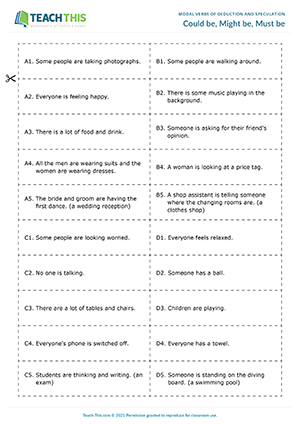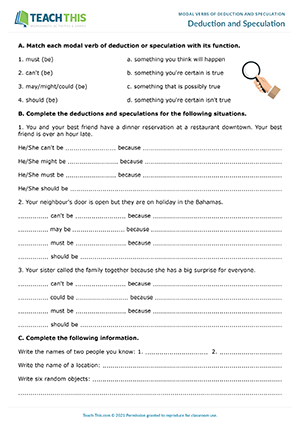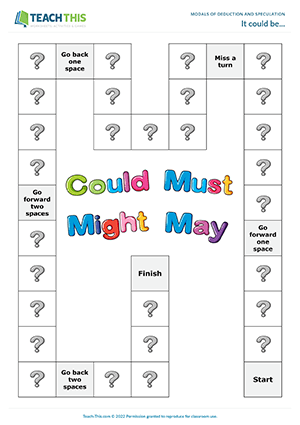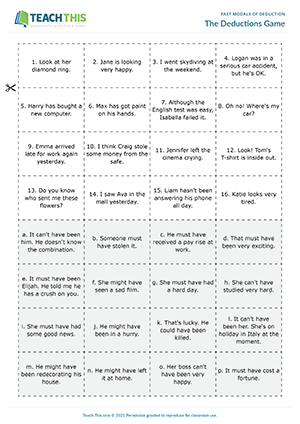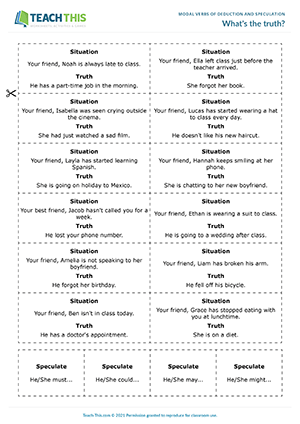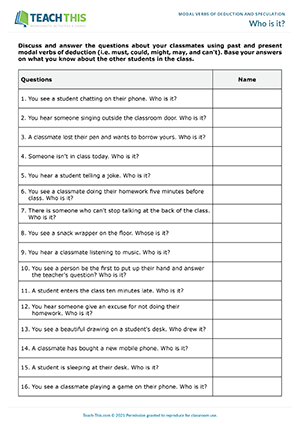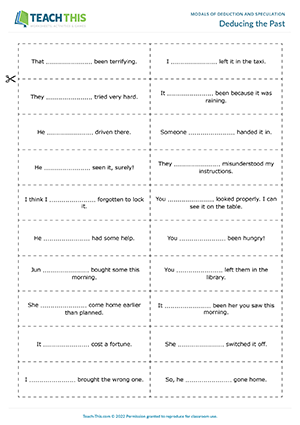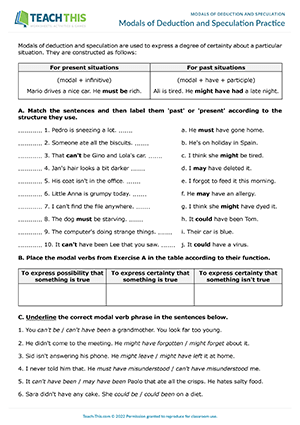In this free modal verbs of deduction speaking activity, students make deductions with could be, might be, can't be and must be, and guess places from descriptions. Students take it in turns to read their first sentence to the group, e.g. 'Some people are walking and some are sitting down'. Group members then make deductions about the place being described, e.g. 'It could be an airport'. The student then reads out a second sentence and the other students continue to make deductions. This continues until they guess the place. Each clue gets progressively easier, so by clue 4 or 5 the students should know the place being described. Afterwards, in pairs, students think of a place and write five clues to describe it. Pairs then read out their clues to another pair who listens and makes deductions, trying to guess the place.
In this productive modal verbs of speculation and deduction worksheet, students make deductions and speculate on what is happening in mysterious situations using must, can't, may, might, could and should (be). Students begin by matching each modal verb of deduction or speculation with its function. Next, students read three situations, make deductions and speculate on what they think is happening in each situation by completing modal verb prompts. Working together, students then brainstorm and write down the names of two people, a location and six random objects. After that, students complete a gap-fill text with the information. The text is about a missing person's case. Students then take on the role of a detective and use modal verbs of deduction and speculation to write a theory about how all the information could be connected to the missing person's case. Finally, students read their theories to the class and then discuss which theory the students think is most plausible.
Here is a fun modal verbs of deduction and speculation board game for intermediate students. In groups, students take turns reading out a situation on a card to the other students. The other students then speculate on the situation and race to make an appropriate sentence that explains the situation using a modal verb of deduction or speculation. The first student to give a grammatically correct explanation that is the same or similar to the answer on the card, rolls the dice and moves their counter along the board. If a student is certain their explanation is correct, they make a sentence with must. If they are not sure about their explanation, they use could, may, or might. The first student to reach the 'finish' square wins. As a variation, students can play in turn rather than racing to answer.
In this useful past modal verbs of deduction game, students speculate on situations using past modal verbs of deduction and try to match sentences and situations together. In groups, students take it in turns to turn over and read a sentence card, e.g. 'Oh no! Where's my car?' The student then speculates on the situation using a past modal verb of deduction (must, could, might, can't + perfect infinitive), e.g. 'It might have been towed away'. The student then turns over a speculation card. If the two cards match (e.g. 'Someone must have stolen it.'), the student keeps the two cards and has another turn. The student with the most pairs of matching cards at the end of the game is the winner.
In this imaginative modal verbs of speculation game, students speculate the truth behind various situations. Students take it in turns to pick up a situation card. The other students in the group then take a speculate card each. The student reads the situation on the card to the group, e.g. 'Your friend, Noah is always late to class'. The other students then begin a conversation where they speculate the truth behind the situation. The aim of the game is for the students to try to guess the truth about the person in the situation using the modal verb of speculation on their card. The student with the situation card listens to the conversation. When someone guesses the truth written on the card, the student stops the conversation and gives the person who guessed correctly the card. The student with the most situation cards at the end of the game wins.
This free modal verbs of deductions speaking activity helps students to practice past and present modal verbs of deduction. In groups, students read each question on the worksheet, e.g. 'You hear a student telling a joke. Who is it?' Students then use past and present modal verbs of deduction to discuss and answer the question. Students base their answer on what they know about their classmates, e.g. 'It could be Jin as he is good at telling jokes'. 'It can't be me because I can't remember jokes', etc. Each group then comes to a consensus and writes down the name of one student. When everyone has finished, the groups give their answers. The named people are asked if they agree that it could be or could have been them and if the justifications are valid. If they say yes, the groups that named the person score one point. The group with the most points at the end is the winner.
In this engaging past modal verbs of deduction game, students match deductions to situations and complete the deductions with the modal verbs: must have, might have, may have, can't have, or couldn't have. In groups, students take it in turns to turn over one situation card and one deduction card. If the situation matches the deduction, the student completes the sentence on the deduction card with an appropriate modal verb. If the group members agree the modal verb of deduction is correct, the student keeps the two cards and has another turn. If not, the student turns the cards back over, keeping them in the same place. The student with the most pairs of cards at the end of the game wins.
Here is a comprehensive modal verbs of deduction and speculation worksheet for upper-intermediate students. First, students match sentences that present a situation to sentences that speculate or deduct a reason for that situation and label them 'past' or 'present' according to the structure they use. Next, students place the modal verbs from Exercise A in a table according to their function. After that, students identify and underline the correct modal verb phrase in sentences. Students then complete sentences with a past or present modal verb, plus a verb in brackets. Following that, students fill sentence gaps by choosing a matching sentence from a box and rewriting it using a modal verb. Lastly, students work in pairs and try to come up with five possible reasons for the situations listed using modal verbs of deduction and speculation.
Latest Free
Resources
- Everyday Objects Bingo
Everyday Objects
Elementary (A1-A2)
- Action Verb Races
Actions
Elementary (A1-A2)
- Birthday Basics
Birthdays
Elementary (A1-A2)
- Sales Phrasal Verbs
Business Phrasal Verbs
Upper-intermediate (B2)
Latest Member
Resources
- Collocations at Work
Business Collocations
Intermediate (B1)
- Etiquette Trivia Board Game
Etiquette and Manners
Upper-intermediate (B2)
- Everyday Objects Vocabulary
Everyday Objects
Pre-intermediate (A2)
- Let's have a talk
Verb-Noun Collocations
Pre-intermediate (A2)



